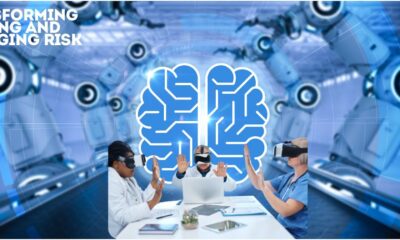Innovations
Top 10 Life-Changing Technology Innovations of the 21st Century

The 21st century has witnessed remarkable technological advancements that have significantly transformed the way we live, work, and interact with the world. These innovations have not only changed individual lives but also reshaped entire industries, economies, and societies. Here’s a look at ten of the most life-changing technology innovations that have emerged in this century.
1. Smartphones
Smartphones have arguably been the most transformative technology of the 21st century. Combining the functionalities of a phone, computer, camera, and more, smartphones have revolutionized communication, entertainment, and information access. The launch of the first iPhone in 2007 by Apple set the stage for the smartphone era, which has since become an indispensable part of daily life for billions of people globally. The evolution of smartphones continues to influence various sectors, including health, education, and business.
Impact: Smartphones have made the internet accessible to the masses, facilitated global communication, and driven the rise of mobile-first businesses. They have also transformed social interactions through social media platforms, making it easier to connect with others and share information instantly.
2. Social Media Platforms
The rise of social media platforms like Facebook, Twitter, Instagram, and TikTok has revolutionized how we communicate, share information, and interact with the world. These platforms have become central to how people consume news, form communities, and even engage in political activism.
Impact: Social media has democratized information, giving voice to individuals and small groups. It has played a crucial role in social movements, such as the Arab Spring and #MeToo, by enabling rapid and widespread mobilization. On the downside, it has also raised concerns about misinformation, privacy, and mental health.
3. Artificial Intelligence and Machine Learning
Artificial Intelligence (AI) and Machine Learning (ML) have made significant strides in the 21st century, driving advancements in various fields, from healthcare and finance to transportation and customer service. AI systems can now perform tasks that typically require human intelligence, such as speech recognition, image processing, and decision-making.
Impact: AI has revolutionized industries by automating complex processes, improving efficiency, and enabling new products and services. In healthcare, AI is being used to develop personalized medicine and improve diagnostic accuracy. In finance, AI-driven algorithms are transforming trading and risk management.
4. Renewable Energy Technologies
The development and deployment of renewable energy technologies, particularly solar and wind power, have marked a significant shift toward sustainable energy sources. Advances in photovoltaic cells, wind turbines, and battery storage have made renewable energy more affordable and accessible, contributing to the global effort to combat climate change.
Impact: The growth of renewable energy has reduced dependence on fossil fuels, leading to a decrease in greenhouse gas emissions. It has also spurred economic growth in green technologies and created new jobs in the energy sector. Countries like Germany and China have become leaders in renewable energy production, setting an example for others to follow.
5. 3D Printing
3D printing, or additive manufacturing, has revolutionized production processes by allowing for the creation of complex structures directly from digital models. This technology has applications in various industries, including healthcare, automotive, aerospace, and construction.
Impact: 3D printing has enabled rapid prototyping, reduced waste in manufacturing, and provided customized solutions, particularly in healthcare with personalized implants and prosthetics. During the COVID-19 pandemic, 3D printing was used to produce essential medical supplies like face shields and ventilator parts.
6. CRISPR and Gene Editing
The development of CRISPR-Cas9, a powerful gene-editing tool, has opened new frontiers in biology and medicine. This technology allows scientists to precisely alter DNA sequences, offering potential cures for genetic disorders and advancing research in fields such as cancer, agriculture, and biotechnology.
Impact: CRISPR has the potential to eliminate genetic diseases, enhance crop resistance to pests, and create new bioengineering possibilities. Ethical concerns, such as the possibility of “designer babies,” have sparked debates on the responsible use of this technology.
7. Blockchain and Cryptocurrencies
Blockchain technology, the backbone of cryptocurrencies like Bitcoin and Ethereum, has introduced a new paradigm in secure and transparent transactions. Blockchain’s decentralized ledger system ensures data integrity and security, with applications beyond finance, including supply chain management, voting systems, and digital identity verification.
Impact: Cryptocurrencies have challenged traditional financial systems, providing new avenues for investment and financial inclusion. Blockchain technology is also being explored for its potential to enhance transparency and reduce fraud in various sectors.
8. Cloud Computing
Cloud computing has transformed how data is stored, processed, and accessed, enabling the rise of scalable and flexible IT infrastructure. Services like Amazon Web Services (AWS), Microsoft Azure, and Google Cloud have made it easier for businesses to deploy and manage applications without the need for physical servers.
Impact: Cloud computing has democratized access to powerful computing resources, enabling startups and small businesses to compete with larger enterprises. It has also facilitated the growth of big data analytics, artificial intelligence, and the Internet of Things (IoT).
9. The Internet of Things (IoT)
The Internet of Things (IoT) refers to the interconnected network of devices that communicate and exchange data with each other. From smart home devices like thermostats and security cameras to industrial applications in manufacturing and logistics, IoT has enhanced efficiency, automation, and convenience in various aspects of life.
Impact: IoT has improved resource management, predictive maintenance, and energy efficiency across industries. In the consumer space, smart devices have made homes more secure and energy-efficient, while in healthcare, IoT has enabled remote monitoring and personalized care.
10. Autonomous Vehicles
Autonomous vehicles (AVs), particularly self-driving cars, have emerged as a transformative technology with the potential to revolutionize transportation. Advances in AI, sensors, and vehicle-to-everything (V2X) communication are driving the development of cars that can navigate and operate without human intervention.
Impact: Autonomous vehicles promise to reduce traffic accidents, improve fuel efficiency, and provide mobility solutions for the elderly and disabled. While fully autonomous vehicles are not yet commonplace, the ongoing development in this field suggests that AVs could soon become a regular feature of urban transportation.
Conclusion
The 21st century has brought about unprecedented technological advancements that continue to reshape our world. These innovations have not only enhanced convenience and efficiency but also raised important ethical, social, and environmental questions. As these technologies evolve, they will undoubtedly continue to have a profound impact on our lives.
-

 Press Release5 days ago
Press Release5 days agoBellarium ($BEL) Price Prediction: Could It Hit $5 by 2026?
-

 Press Release2 days ago
Press Release2 days agoClinical Trials Market Set for Robust Growth, Driven by Drug Development Surge and Digital Innovation
-

 Business4 days ago
Business4 days agoHow Managed IT Solutions Help Small Teams Compete at Enterprise Scale
-

 Press Release3 days ago
Press Release3 days agoIndustrial Boiler Market Expected to Surpass USD 24.4 Billion by 2035 Amid Growing Demand for Energy Efficiency and Industrialization
-

 Press Release3 days ago
Press Release3 days agoPreventive Vaccines Market to Witness Strong Growth by 2035
-

 Press Release3 days ago
Press Release3 days agoGreen Bio Chemicals Market Poised for Sustainable Growth amidst Global Shift to Eco-Friendly Alternatives by 2035
-

 Press Release3 days ago
Press Release3 days agoFill-Finish Pharmaceutical Contract Manufacturing Market Expected to Flourish Amid Biopharmaceutical Boom and Global Outsourcing Trend by 2035
-

 Press Release3 days ago
Press Release3 days agoPet Food Nutraceutical Market Set for Robust Expansion Amid Rising Demand for Pet Wellness by 2035






























